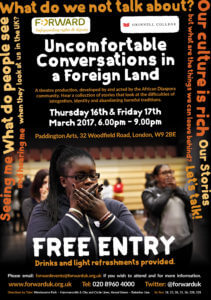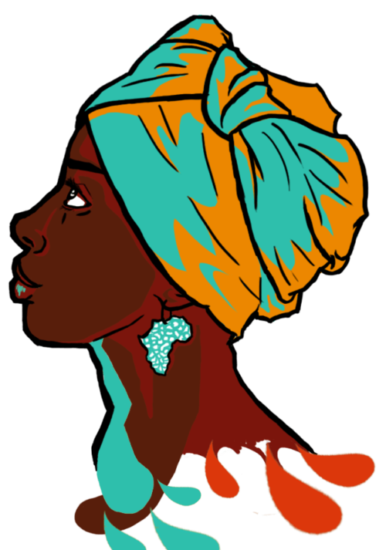African Diaspora Community Develop and Perform Play
 In March 2017, a group of members of the African diaspora developed and performed in a theatre production Uncomfortable Conversations in a Foreign Land. The project was done in partnership between FORWARD and Grinnell College and a number of FORWARD’s Community Champions took part.
In March 2017, a group of members of the African diaspora developed and performed in a theatre production Uncomfortable Conversations in a Foreign Land. The project was done in partnership between FORWARD and Grinnell College and a number of FORWARD’s Community Champions took part.
In the production you can hear a collection of stories that look at the difficulties of integration, identity and abandoning harmful traditions. It was developed over 2 months from focus group work with men, women and young people from various African diaspora communities in London, and all the stories are real. With little to no experience in performing arts, the actors worked on the production to bring real stories from the community to the public.
The play was developed with the assistance of Lesley Delmenico, an Associate of Grinnell College. She directs and teaches acting and performance studies as well as theatre history, postcolonial and post-war British drama. Her research continues in intercultural and community-based performance. Each performance was followed by a panel discussion involving health workers, anti-FGM organisations and members of the Men Speak Out against FGM project. Our special thanks to playwright Charlene James (writer of Cuttin’ It) for the acting workshops; to Faiha Yousif, Omolayo Joy Ajetunmubi, Oluwaseun Okeniyi, Sharon Otim and FORWARD community champions for helping develop the concept of the production.
This is an ongoing project and we hope to perform Uncomfortable Conversations in a Foreign Land across the UK later in the year to highlight the important conversations which are often hidden.

The performance explores a number of themes:
Immigration and culture
“I’m free here but I’m not always comfortable.”
“We try to make a small island of our community in this island.”
“To wear hijab or not to wear hijab?”
Parenting
“We have a saying – lemons don’t come from oranges.”
FGM
“I’ve heard that if the mother has had FGM, they assume the girl is at risk.”
“I’m much more than what happened to me”
Sex and Relationships
“I have spoken to my friends about this, but I have never spoken to you, my husband.”
“Does it matter who feeds the family?”
“I’m perfectly fine. But my husband did just divorce me”
Domestic Violence
“How do you come out of the shadow?”

